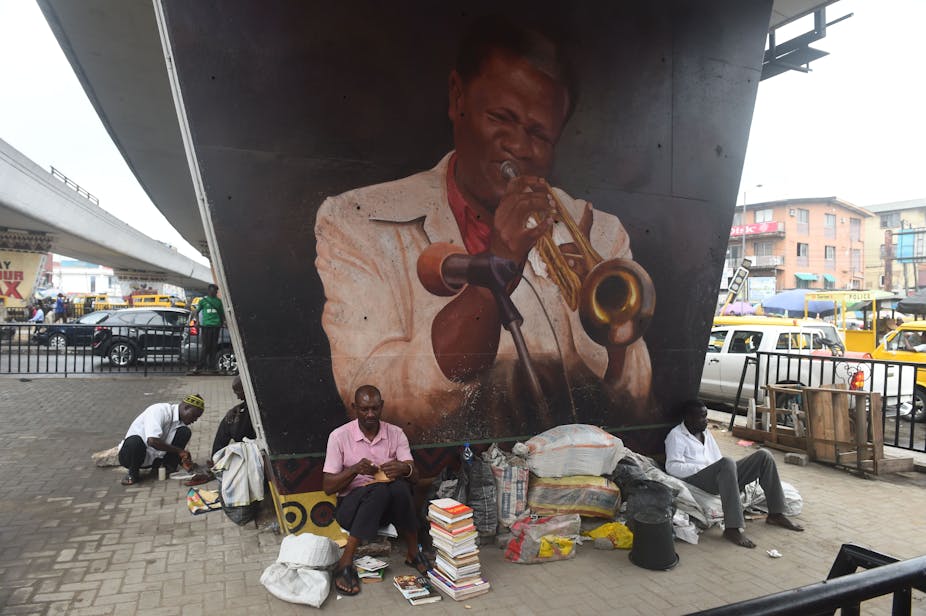Even at the ripe old age of 89, the recent death of Victor Abimbola Olaiya, renowned trumpeter and highlife maestro was shocking to his legion of fans across Nigeria and beyond.
It was unexpected because he had for long lived in the hearts of his admirers through his numerous songs and showmanship, and had somehow attained the status of being immortal. Olaiya used music to advocate for the rights of ordinary people and the downtrodden. But he didn’t stop there: prolific and proficient in his art, he doled out songs about love, women, youths, workers and life in general.
But Olaiya, the accomplished musician, is no more. All his legendary exploits and prodigious artistry now belong to the past. The joy of his departure, however, is that he lived and worked well to earn himself fame and honour at home and abroad, using the instrumentality of the highlife genre.
He was born on December 31, 1930 in Calabar, Cross River State, the 20th child of a family of 24. As a teenager in the 1940s Olaiya took to music secretly for fear of being castigated by his rich family members. Music was not popular as a profession as musicians were seen as beggars.
In the same way that the late Afrobeat legend, Fela Anikulapo Kuti rejected his parents’ counsel to study medicine, Olaiya too shunned engineering for music. He turned down an admission at Howard University in the US to pursue a career in music.

At the time he started playing music, Olaiya was just a sojourner in a precarious vocation. He admitted that musicians were generally regarded as lazy people and the ‘ne'er-do-wells’. But he shunned the bohemian lifestyle of his peers and worked hard to emerge as a musician of repute with a home and family to be proud of.
His big break came at the age of 29 when he had the privilege to perform during Nigeria’s Independence Day celebration on October 1, 1960. The occasion enabled young Olaiya to launch himself into stardom. And set the stage for a bright musical career.
Launch pad
Olaiya became the star of the Independence Day ball following his nomination by the then Minister of Social Welfare, J.M Johnson. The ace trumpeter led other musicians drawn from different parts of the country and the police band to entertain guests during the occasion. Among other notable musicians who performed at the ceremony were Zeal Onyia, Bobby Benson, Dele Bamgbose, E.C Arinze, Charles Nwegbue and Eddy Okonta.

The high point of Olaiya’s performance was a warm handshake with Queen Elizabeth of England and a torrent of commendations from such dignitaries as the then Prime Minister Tafawa Balewa. Fifty three years later, Olaiya again had the opportunity to entertain Queen Elizabeth during the Commonwealth Heads of Government Meeting in Abuja, Nigeria’s capital.
He was a master trumpeter, a gifted composer and a genius in showmanship. He sang in major Nigerian languages of Yoruba, Igbo, Efik and Ibiobio. This paved the way for the acceptance of his music across Nigeria. He was also popular in neighbouring countries like Ghana, Republic of Benin and Sierra Leone.
His dexterity and popularity with the trumpet attracted him to many talented musicians such as Bala Miller, Fela Anikulapo Kuti, Bobby Benson and Tony Allen.

His love for music also made him invest in selling musical instruments while his business acumen helped him build the popular Stadium Hotel in Lagos. The hotel afforded him ample space and a base for regular performances with his All Stars band.
Wide reach
Highlife music is a West African genre of music which originated from Ghana in the late 19th century. It later spread to Western Nigeria and became quite popular in both countries in the 1950s through the 1960s. The music combined the melody and rhythm of the Akan music. Olaiya took up highlife music in the late 1950s and combined it with the trumpet to improve on its texture and aesthetic quality.
One of the hybrids of highlife music is Afrobeat which was created and promoted by the late Fela Anikulapo Kuti and was later played by other artistes.
Olaiya also took Highlife music to the Congo where he played alongside T.P.O.K Jazz. He equally had a remarkable performance with popular trumpeter and jazz singer, Louis Armstrong when Armstrong visited Nigeria. Olaiya inherited his use of a white handkerchief from Armstrong whom he once described as a very neat and hard working musician.
A native of Ijesha-Ishu town in Ekiti State, Olaiya’s music career saw him performing for Sammy Akpabot’ Sex-tet, the old Lagos City Orchestra and the Jam Session Orchestra by Bobby Benson before forming his own band in 1954.
A legendary singer who produced and promoted many songs to his credit, Olaiya also had a duet with the late Ghanaian highlife singer, E.T Mensah. His versatility helped him in 2013 when he collaborated with a pop singer, 2Face Idibia. The collaboration led to the remix of Olaiya’s evergreen song; Baby Mi Da.
He was a fellow of the Institute of Administrative Management of Nigeria, and a recipient of honorary Doctor of Music from City University of Los Angeles. Olaiya was also a representative of African musicians at the Prague International Festival in former Czechoslovakia while the Nigerian government gave him a national award, the Order of the Niger.
Some of the evergreen songs by Olaiya included Ilu le, Omo Pupa, Ekiti na bimi, Oro Ajoso, Africa, Kendi Mama, Iye Jemila, Eko Ile, Olofofo, Se fun mi, Oruku tindi tindi, Tina mata, Pariboto Riboto, Mr Judge and Bottom Belle.

